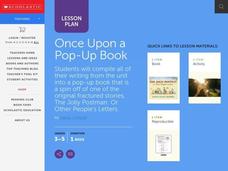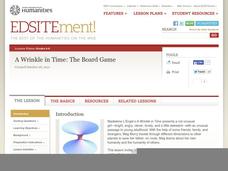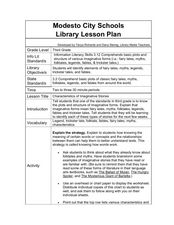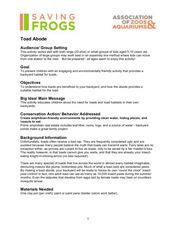Curated OER
Once Upon a Pop-Up Book
Students design and illustrate a pop-up book of their original writing after studying the book, The Jolly Postman: Or Other People's Letter's. They present their book and complete a self-assessment rubric.
John F. Kennedy Center
Folktale Theatre
Introduce your middle schoolers to a performance and movement activity that uses their favorite stories from fairytales and folklore. They practice basic acting skills, create dialogues with a partner, and then as guided practice,...
Curated OER
Applying Ahimsa to Traditional Stories
Investigate the life of Mahatma Gandhi by researching non-violent lifestyles. Learners define the word ahimsa and discuss the personal characteristics that made Gandhi a peaceful warrior. They also create a poster about the story "The...
Curated OER
Story Pyramids
Young writers generate descriptive words. They use pictures of various landscapes (from books, magazines, or the Internet) and complete a story pyramid. The pyramid (included here) asks to describe the main character, the setting, and...
Curated OER
The Coin and the Fable: Alaska quarter reverse
An Alaskan quarter and a book of fables is what you'll need to start this lesson. Learners will use the image of the bear and the salmon found on the reverse side of the Alaskan quarter as inspiration. They will compose a fable about the...
Media Literacy
Once Upon a Time
Robert Munsch's The Paperbag Princess and Jon Scieszkafrom's The True Story of the Three Little Pigs launch a discussion of the role of stereotypes in stories and movies.
Curated OER
Idioms
Use this podcast instructional activity to familiarize scholars with the characteristics, history, and cultural implications of idioms. As part of the Walking Classroom curriculum, kids listen to a 12-minute podcast as they walk around...
National Endowment for the Humanities
A Wrinkle in Time: The Board Game
Tackle some big questions about A Wrinkle in Time by Madeleine L'Engle with a board game project. As learners brainstorm for and complete their board games, they consider what helps and hinders Meg on her journey and why she succeeds in...
Curated OER
Characteristics of Imaginative Stories
Third graders explore genre characteristics. In this genre literacy lesson, 3rd graders listen to a variety of fiction stories and classify them according to genre. Students identify common features in each genre and complete a chart by...
Curated OER
Genre Study - Grade Three
Third graders learn to identify different types of literature genres. In this genre instructional activity, 3rd graders complete pre and post- assessment, conduct a genre research activity, and complete the associated worksheets.
Curated OER
Can We Switch Genders of Story Characters?
Students read and review the main elements of a story. In this language arts lesson, students predict what the story read to them would have been like if the genders of the characters had been different. Students write a new story in...
Curated OER
Who's Afraid of the Big, Bad Wolf?
Learners, at the advanced beginner to low intermediate ESL levels, demonstrate comprehension of the play or story, "Little Red Riding Hood." They construct interviews based on knowledge of the characters in the play Little Red Riding Hood.
Curated OER
Cloudy With a Chance of Meatballs
Fourth graders participate in a play to work on seeing events from a different perspective. Some of them are reporters, some cameramen and women, and others are interviewed. They put themselves in the shoes of the people in the book...
Curated OER
Memory and Learning
Students identify parts of the brain and what each part does. In this brain anatomy lesson, students participate in activities that focus on the job of each part of the brain co connect the task to the brain section. Students make a...
Curated OER
Classifying Plants and Insects
Art and science come together in a lesson based on Flower Still Life by Ambrosius Bosschaert the Elder. Learners classify plants and insects in the painting by color, leaf shape, size, reproduction, and season of bloom.
Curated OER
Toad Adobe
Students explore the importance of toads and the need for toad habitats in the environment. In this animal habitats lesson, students create an adobe habitat for toads by using a clay pot. Students paint their pots and place them in their...
Curated OER
Combating Corrosion
Study corrosion on bronze statues with a hands-on lesson. As pupils place a penny in water with salt, they observe the changes in the penny throughout a period of a week. They then analyze the pre-conservation and the post-conservation...
Curated OER
What Makes a Fable?
Third graders explore fables. In this fables lesson, 3rd graders use Venn Diagrams to organize information about 2 fables they will read. Students work in groups to fill out the diagrams and share their results with the class. Students...
Curated OER
Is the Brady Bunch Biased
Students examine gender bias on television and in the movies. In this social science lesson, students watch various shows and when an instance of stereotypical behavior, or gender bias situation occurs, students think about the problem....
Curated OER
Writing Myths
Students read and write myths. In this world mythology lesson, students read and analyze myths from various cultures and then recognize their attributes as they write their own myths that explain natural phenomena.
Other popular searches
- Fractured Fairy Tales
- Fables and Fairy Tales
- Fairy Tales Drama
- Writing Fairy Tales
- Grimm Brothers Fairy Tales
- Elements of Fairy Tales
- Rewriting Fairy Tales
- Tall Tales Fairy Tales
- Fairy Tales Lessons
- Fractured Fairy Tales Skit
- Art Fairy Tales
- Fairy Tales Around the World





















